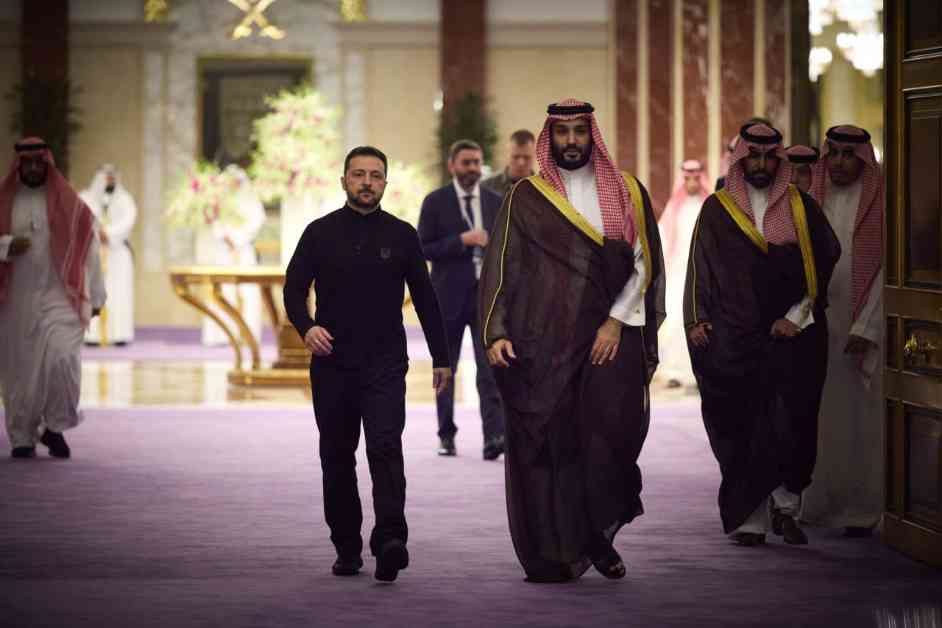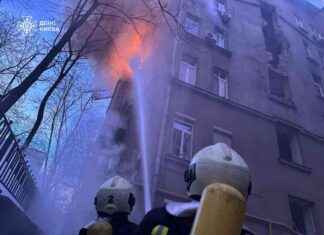Ukrainian President Volodymyr Zelenskyy’s recent meeting with Saudi Crown Prince Mohammed bin Salman in Jeddah on 10 March has garnered significant attention, particularly with crucial talks between Ukrainian and US officials looming on the horizon. These discussions are aimed at establishing a framework for peace and ultimately bringing an end to the ongoing conflict between Russia and Ukraine.
The meeting between Zelenskyy and the Saudi Crown Prince comes at a critical juncture, especially considering the shifting dynamics in international relations. Under the previous administration led by President Donald Trump, the United States, which was once a staunch ally of Ukraine, altered its approach to the Russian invasion of Ukraine. This change in policy saw a direct engagement with Moscow, while also halting military assistance and intelligence sharing with Ukraine.
During their meeting, the Saudi Crown Prince reiterated Saudi Arabia’s support for international initiatives aimed at resolving the crisis in Ukraine and achieving lasting peace. This demonstration of solidarity was highlighted in a report by the Saudi state news agency SPA on 11 March, as reported by Reuters.
Zelenskyy, in turn, expressed his gratitude for the crown prince’s perspective on the global scenario and for the unwavering support extended to Ukraine. In a post on his Telegram account, Zelenskyy emphasized the significance of hearing words of confidence in Ukraine’s future, underscoring the importance of international backing during challenging times.
Following his visit to Saudi Arabia, Zelenskyy will not be present at the upcoming talks with US officials, which include prominent figures such as State Secretary Marco Rubio, White House national security adviser Michael Waltz, and Middle East envoy Steve Witkoff. However, the Ukrainian delegation in Jeddah comprises key figures such as his chief of staff Andrii Yermak, Foreign Minister Andrii Sybiha, Defence Minister Rustem Umierov, and deputy head of the presidential office Pavlo Palisa.
Proposed Ceasefire and Territorial Concessions
As discussions intensify around the peace negotiations, there are emerging proposals and expectations from the Ukrainian side. Zelenskyy has previously indicated a willingness to engage in constructive dialogue, emphasizing the urgency of making necessary decisions promptly and effectively. Realistic proposals have been put forward, with a focus on expediting the peace process to bring about tangible outcomes.
Notably, senior Ukrainian officials have hinted at proposing a ceasefire that encompasses the Black Sea region and addresses concerns related to long-range missile strikes. Additionally, there are discussions surrounding the potential release of prisoners as part of confidence-building measures. Zelenskyy has stressed the importance of these steps as a litmus test for Russia’s commitment to ending the conflict, despite Moscow’s reservations about temporary truces.
Russia’s control over a significant portion of Ukrainian territory, including the annexed Crimea, coupled with its advances in eastern Donetsk Oblast, has heightened the urgency for constructive dialogue and meaningful progress in the peace negotiations. The increasing drone and missile strikes on cities further away from the front lines underscore the critical need for swift and decisive actions to address the escalating crisis.
International Perspectives and Diplomatic Engagements
Against the backdrop of these developments, there has been a flurry of diplomatic engagements and international perspectives on the Ukraine-Russia conflict. US Senator Marco Rubio’s stance on territorial concessions from Ukraine to mitigate further suffering has sparked debates and discussions within diplomatic circles. The nuanced approach to balancing territorial integrity with the imperative of peace underscores the complexities of the situation.
In parallel, the visit of US Sen. Kelly following Elon Musk’s controversial remarks, as well as reports of upcoming meetings between Trump’s officials and Russian delegations, point to a broader diplomatic landscape that is evolving rapidly. The intricacies of restoring US intelligence and arms aid to Ukraine, amid ongoing freezes and policy shifts, add layers of complexity to the peace negotiations.
As Zelenskyy navigates the diplomatic challenges ahead and works towards a sustainable peace framework, the world watches with bated breath to see how these critical discussions unfold. The road to peace is fraught with obstacles and uncertainties, but the commitment to dialogue and resolution remains steadfast among key stakeholders.
The evolving dynamics of the Ukraine-Russia conflict underscore the delicate balance between diplomatic negotiations, strategic considerations, and the human cost of war. As leaders grapple with the complexities of peacebuilding and conflict resolution, the hope for a brighter and more peaceful future for Ukraine and its people remains a driving force in the ongoing discussions.

















